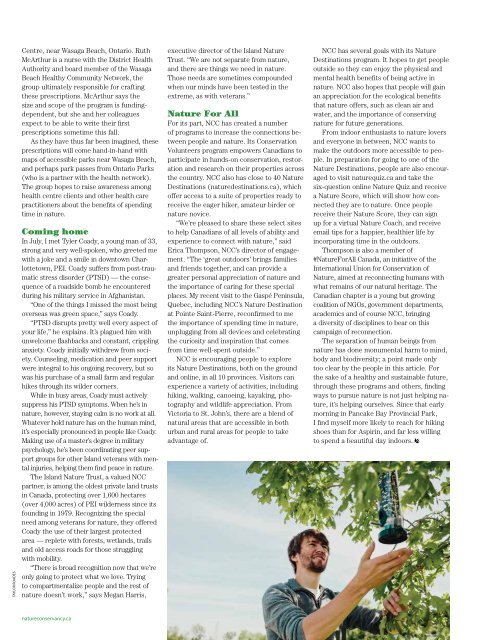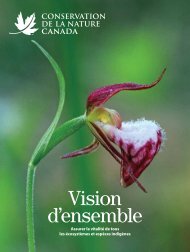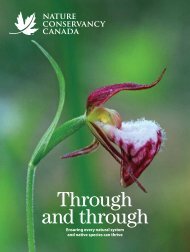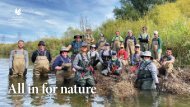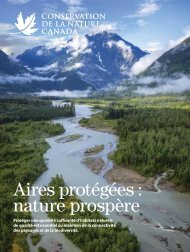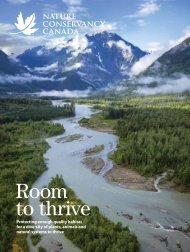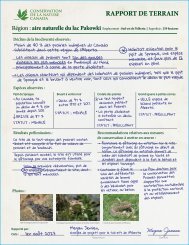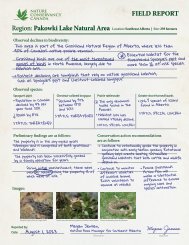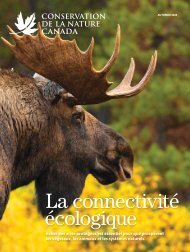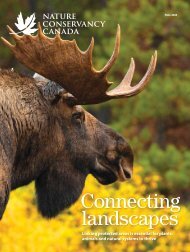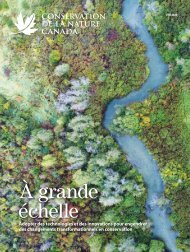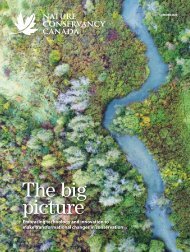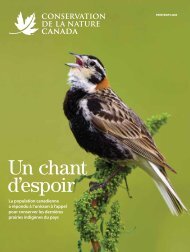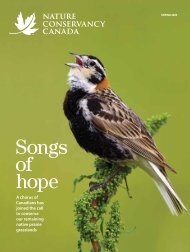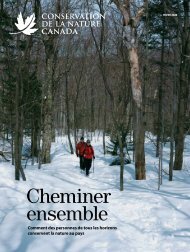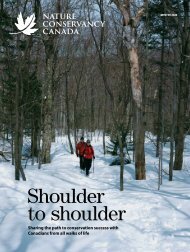NCC Magazine: Fall 2019
Create successful ePaper yourself
Turn your PDF publications into a flip-book with our unique Google optimized e-Paper software.
TAYLOR ROADES.<br />
Centre, near Wasaga Beach, Ontario. Ruth<br />
McArthur is a nurse with the District Health<br />
Authority and board member of the Wasaga<br />
Beach Healthy Community Network, the<br />
group ultimately responsible for crafting<br />
these prescriptions. McArthur says the<br />
size and scope of the program is fundingdependent,<br />
but she and her colleagues<br />
expect to be able to write their first<br />
prescriptions sometime this fall.<br />
As they have thus far been imagined, these<br />
prescriptions will come hand-in-hand with<br />
maps of accessible parks near Wasaga Beach,<br />
and perhaps park passes from Ontario Parks<br />
(who is a partner with the health network).<br />
The group hopes to raise awareness among<br />
health centre clients and other health care<br />
practitioners about the benefits of spending<br />
time in nature.<br />
Coming home<br />
In July, I met Tyler Coady, a young man of 33,<br />
strong and very well-spoken, who greeted me<br />
with a joke and a smile in downtown Charlottetown,<br />
PEI. Coady suffers from post-traumatic<br />
stress disorder (PTSD) — the consequence<br />
of a roadside bomb he encountered<br />
during his military service in Afghanistan.<br />
“One of the things I missed the most being<br />
overseas was green space,” says Coady.<br />
“PTSD disrupts pretty well every aspect of<br />
your life,” he explains. It’s plagued him with<br />
unwelcome flashbacks and constant, crippling<br />
anxiety. Coady initially withdrew from society.<br />
Counseling, medication and peer support<br />
were integral to his ongoing recovery, but so<br />
was his purchase of a small farm and regular<br />
hikes through its wilder corners.<br />
While in busy areas, Coady must actively<br />
suppress his PTSD symptoms. When he’s in<br />
nature, however, staying calm is no work at all.<br />
Whatever hold nature has on the human mind,<br />
it’s especially pronounced in people like Coady.<br />
Making use of a master’s degree in military<br />
psychology, he’s been coordinating peer support<br />
groups for other Island veterans with mental<br />
injuries, helping them find peace in nature.<br />
The Island Nature Trust, a valued <strong>NCC</strong><br />
partner, is among the oldest private land trusts<br />
in Canada, protecting over 1,600 hectares<br />
(over 4,000 acres) of PEI wilderness since its<br />
founding in 1979. Recognizing the special<br />
need among veterans for nature, they offered<br />
Coady the use of their largest protected<br />
area — replete with forests, wetlands, trails<br />
and old access roads for those struggling<br />
with mobility.<br />
“There is broad recognition now that we’re<br />
only going to protect what we love. Trying<br />
to compartmentalize people and the rest of<br />
nature doesn’t work,” says Megan Harris,<br />
executive director of the Island Nature<br />
Trust. “We are not separate from nature,<br />
and there are things we need in nature.<br />
Those needs are sometimes compounded<br />
when our minds have been tested in the<br />
extreme, as with veterans.”<br />
Nature For All<br />
For its part, <strong>NCC</strong> has created a number<br />
of programs to increase the connections between<br />
people and nature. Its Conservation<br />
Volunteers program empowers Canadians to<br />
participate in hands-on conservation, restoration<br />
and research on their properties across<br />
the country. <strong>NCC</strong> also has close to 40 Nature<br />
Destinations (naturedestinations.ca), which<br />
offer access to a suite of properties ready to<br />
receive the eager hiker, amateur birder or<br />
nature novice.<br />
“We’re pleased to share these select sites<br />
to help Canadians of all levels of ability and<br />
experience to connect with nature,” said<br />
Erica Thompson, <strong>NCC</strong>’s director of engagement.<br />
“The ‘great outdoors’ brings families<br />
and friends together, and can provide a<br />
greater personal appreciation of nature and<br />
the importance of caring for these special<br />
places. My recent visit to the Gaspé Peninsula,<br />
Quebec, including <strong>NCC</strong>’s Nature Destination<br />
at Pointe Saint-Pierre, reconfirmed to me<br />
the importance of spending time in nature,<br />
unplugging from all devices and celebrating<br />
the curiosity and inspiration that comes<br />
from time well-spent outside.”<br />
<strong>NCC</strong> is encouraging people to explore<br />
its Nature Destinations, both on the ground<br />
and online, in all 10 provinces. Visitors can<br />
experience a variety of activities, including<br />
hiking, walking, canoeing, kayaking, photography<br />
and wildlife appreciation. From<br />
Victoria to St. John’s, there are a blend of<br />
natural areas that are accessible in both<br />
urban and rural areas for people to take<br />
advantage of.<br />
<strong>NCC</strong> has several goals with its Nature<br />
Destinations program. It hopes to get people<br />
outside so they can enjoy the physical and<br />
mental health benefits of being active in<br />
nature. <strong>NCC</strong> also hopes that people will gain<br />
an appreciation for the ecological benefits<br />
that nature offers, such as clean air and<br />
water, and the importance of conserving<br />
nature for future generations.<br />
From indoor enthusiasts to nature lovers<br />
and everyone in between, <strong>NCC</strong> wants to<br />
make the outdoors more accessible to people.<br />
In preparation for going to one of the<br />
Nature Destinations, people are also encouraged<br />
to visit naturequiz.ca and take the<br />
six-question online Nature Quiz and receive<br />
a Nature Score, which will show how connected<br />
they are to nature. Once people<br />
receive their Nature Score, they can sign<br />
up for a virtual Nature Coach, and receive<br />
email tips for a happier, healthier life by<br />
incorporating time in the outdoors.<br />
Thompson is also a member of<br />
#NatureForAll Canada, an initiative of the<br />
International Union for Conservation of<br />
Nature, aimed at reconnecting humans with<br />
what remains of our natural heritage. The<br />
Canadian chapter is a young but growing<br />
coalition of NGOs, government departments,<br />
academics and of course <strong>NCC</strong>, bringing<br />
a diversity of disciplines to bear on this<br />
campaign of reconnection.<br />
The separation of human beings from<br />
nature has done monumental harm to mind,<br />
body and biodiversity; a point made only<br />
too clear by the people in this article. For<br />
the sake of a healthy and sustainable future,<br />
through these programs and others, finding<br />
ways to pursue nature is not just helping nature,<br />
it’s helping ourselves. Since that early<br />
morning in Pancake Bay Provincial Park,<br />
I find myself more likely to reach for hiking<br />
shoes than for Aspirin, and far less willing<br />
to spend a beautiful day indoors.1<br />
natureconservancy.ca<br />
FALL <strong>2019</strong> 11


